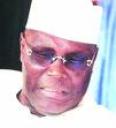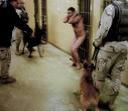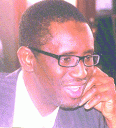
 Nigeria’s Vice President Atiku Abubakar
Nigeria’s Vice President Atiku Abubakar
Mallam Nuhu Ribadu, chairman of the Economic and Financial Crimes Commission (EFCC), asked a question that has concentrated the minds of many, particularly people outside our shores, for too long.
Speaking during a seminar organised by the University of Ibadan chapter of the Academic Staff Union of Universities (ASUU), Ribadu wondered aloud why in the face of the wanton rape of our patrimony by unconscionable men and women who call themselves leaders, Nigerians are not angry.
No doubt, it was a deeply pained Ribadu that asked his audience why they chose to remain the “happiest” people in the world in the face of their contrived grim situation. “Why can’t we be angry?” he asked them. Knowing Nigerians well, rather than mope and feel very unhappy and full of pity for themselves at that point, most must have giggled hysterically.
But Ribadu was not done yet. “Where is the outrage among our compatriots who are so easily pricked to revolt in instances of ethnic and religious challenge…where is the revolt from the elite, the academics and the professionals who are engines of social growth in any community?” Of course, he got a standing ovation for his speech.
But Ribadu could well have saved his breath. Nigerians are a special breed of people. They have the incomprehensible and bizarre capacity of being happy in the worst of circumstances. A Nigerian could even applaud a man, contemptuous enough of him, to rape his mother in his presence.
Ribadu was wondering why any human being with any sense of self would perceive Chiefs Lamidi Adedibu and Bayo Alao-Akala as leaders.
In any decent society, Adedibu would by now be spending his thuggish life in jail. But not in
Nigeria! Here, he is applauded, even by those at the highest reaches of government, as the issue in Oyo, if not Yoruba, politics. And you wonder what calibre of human beings populate this country.
You can hardly see any other people than can endure the humiliation, degradation, deprivations, squalor and ruin that our so-called leaders visit on us everyday. Rarely can you see any leadership elsewhere, treat its citizens with so much contempt, scorn and condescension without having a revolt on their hands.
Revolt does not necessarily have to be violent. But there comes a time in the life of a people when they cannot but protest against the attitude of their leaders towards them. Why are Nigerians not revolted by the salacious confessions of the two highest ranking public office holders in the country?
Early last month, many Britons were up in arms against the Communities Secretary, Ms Ruth Kelly, who decided to send her son to a £15,000-a-year specialist private prep school in Oxfordshire to help with his learning difficulties. Her nine-year-old son is suffering from dyslexia, a slight disorder of the brain that causes difficulty in reading and spelling. Before taking on her current job in May 2006, she was the Education Secretary for 17 months.
Ms Kelly’s three other children still attend a state school in Tower Hamlets, east London. The outrage over her decision to put her son with “substantial learning difficulties” in a private school forced her to issue a public statement explaining that she took the decision based on “professional advice – which the local authority accepts” and that the boy will only be in the school for two years “before he begins at a state secondary school.”
But the people were not impressed. Their anger was not assuaged by her plea. To them, the minister’s conduct was hypocritical. While conceding her the right to offer her child the best, which includes placing him in a school that will be able to meet his particular needs, their angst border on the fact that not all Britons can afford to send their dyslexic children to a £15,000 private school. They argue that it is the responsibility of the government to strengthen the capacity of public schools to handle such cases by increasing funding for special-needs provision within the state sector.
Here in the UK, Prime Minister Tony Blair’s children are enrolled in the same public schools attended by the children of the Nigerian immigrant who is working as a factory labourer.
Presently, the anger of the British people is boiling over because of the cash-for-peerages scandal. Penultimate Friday, the police interviewed Tony Blair for 45 minutes. That was the second time he would be quizzed over the matter. Lord Levy, Labour Party’s chief fundraiser had already been arrested and questioned on suspicion of perverting the course of justice. The people are scandalised that their government was selling “national honours,” which ought to be conferred on merit, to the highest bidders.
Recently, Washington DC erupted in anger as Americans vented their spleen on their president over the Iraqi war. All over the world, people revolt against their governments when they err. But not in
Nigeria! You would hardly hear a whimper no matter how horrendous a government policy is.
Britons are angry that a former Education Minister sent her educationally-challenged son to a private school rather than ensuring that the government provides the same facilities in public schools where the children of both the poor and the rich would have equal access. And you ask: Why are Nigerians not angry that their leaders destroyed public schools only to establish private universities and secondary schools where only the children of the rich can acquire decent education?
Why are Nigerians not angry that their leaders send their children to the best private and public schools in Europe and America, with public funds, to acquire the best of education while own children are left at the mercy of demoralised teachers, dilapidated infrastructure and cultists?
Why are Nigerians not angry that the Lords of the manor are busy equipping their children with the right skills through decent education, acquired at public expense, while ensuring that their own children end up as ‘drawers of water and hewers of wood?’
Why are Nigerians not gnashing their teeth at their so-called leaders who are happy leaving the Nigerian hospitals the way they met them eight years ago – mere consulting clinics or even worse, while they travel abroad for the treatment of the commonest of ailments?
Almost every Nigerian leader who has died in the past decade died either in a South African, Saudi Arabian, European or American hospital. They proudly announce when they are going for their regular medical check-ups abroad. Yet, hospitals at home cannot boast of the commonest of drugs and the people are not complaining.
Why are Nigerians not fuming that the private businesses of their leaders, which they run from public office, are flourishing while theirs are dying everyday due to harsh economic environment?
While are Nigerians not beside themselves with rage that their leaders can raise N2 billion “loan” from the banks, using nothing other than their offices as collateral when they cannot get from the same banks a paltry N20,000 to finance their small-scale businesses?
Ribadu alleged that a governor bought four aircraft for his personal use. Nigerian leaders no longer travel in commercial aircraft. Those who have not bought their own planes now charter jets to move about in the country and even to travel abroad. The aircraft in the presidential fleet is enough to resuscitate the moribund Nigeria Airways. Our leaders now fly from one part of the country to the other in jumbo jets. When they land at the nearest airport, they hop into waiting helicopters to complete the journey to their villages. Yet, in this same country, poverty walks on all fours. Minimum wage a month remains N7,500, equivalent of £30.
Why are Nigerians not fuming that those who are enjoying these luxuries at their expense have not been considerate enough even to build good roads for them?
Why is it that Nigerians don’t get angry when they see men and women with whom they were living in squalid ‘face-me-I-face-you,’ riding in the same molue bus with 44 sitting and 77 standing, and eating at the same buka only yesterday suddenly become multi-millionaires who can afford to send their children to Europe and ride the best cars simply because they are now in government?
Why is it that Nigerians cannot get angry when they go out on Election Day to vote for those they want to be their leaders, only for other people to be announced winners at the end of the day?
What stops indigenes of Oyo State from venting their spleen on Adedibu and his co-travellers on the boulevard of infamy? What stops them from staging a massive protest in Ibadan, vowing never to get off the streets unless and until the police arrest Adedibu over his illegal possession of six Independent National Electoral Commission’s Direct Data Capture machines.
What stops Anambra indigenes from marching to the state House of Assembly and sacking the thugs pretending to be lawmakers? What stops indigenes of Oyo from sacking the ruffians who have turned the hallowed lawmaking chambers into marijuana smoking complex?
Why can’t Nigerians protest unless someone rents them for the purpose of scoring cheap political points against their enemies?
Of course, many will point at the brutal character of the Nigerian state and sadistic tendency of those in power who will not hesitate in unleashing violence on citizens who dare protest. But that is defeatist. How many people can the police kill when the righteous anger of the people boil over.
Nigerians have themselves to blame for the impunity of those in power. In any other clime other than ours, the anger of the people would have by now left so many so-called leaders swinging in the wind. In
Nigeria, we would rather pray for them to live long. They kill, maim and rig themselves into power and insult us with the mumbo-jumbo that power comes from God and we ululate.
And to imagine that these same people that cannot raise a finger of protest in the face of impudent heist of their patrimony will not think twice before pouncing on each other, killing and maiming themselves, in an orgy of religious cum ethnic warfare. Ours is indeed a strange county, populated by strange people.


